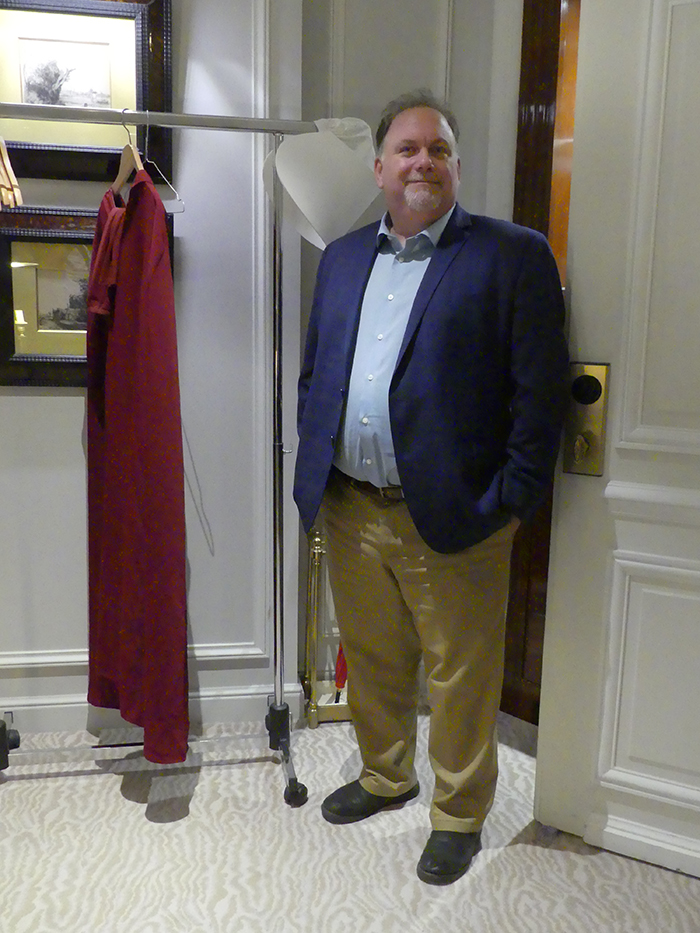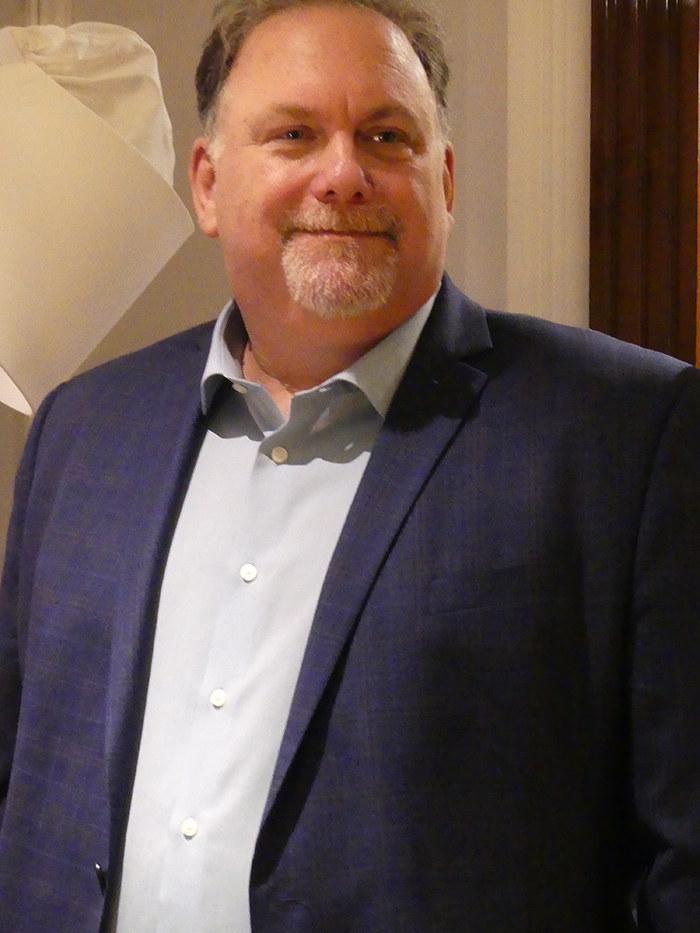Interview - Handmaid's tale : We have a long talk with Bruce Miller
By Mulder, Hôtel Plaza Athénée, 28 may 2018
Q : How did you work on the season two without books and what was Margaret Atwood’s work on this second season ?
Bruce Miller : with Margaret we really started to talk about season two half way through season one , visually we have to think about kind of where you’re going even we have plan end the season one as the book ended, we have to be very careful with what you lay in so you can make a second season. I don’t feel like season two is a departure from season one, it still Margaret world, still the characters, still the dynamics and all. It still feel that tone of Atwood but it was not so hard, because I don”t know If you have read the book, but when you read the book all you want is season two. I have been thinking about season two since I have read the book, since college so there is a lot of things that are mentioned in the book that we want to explore, the colonies, the child marriage part of the book. There were a lot of things for us to explore so we were working with very strong foundations and Margaret was involved in season two since the beginning, came in the writers room and talk to us. Honestly, the acclaim that season one got was harder to handle then the writing part, the writing part I’m used to, that part I wasn’t used to.
Q: We know that there are going a season 3, so for you, so how many seasons do you wish ?
Bruce Miller : you know in one hand I don’t know what the number is but I think there is a number. I certainly don’t want to stretch the show out, I was hit that one, I watched the show that I like and it goes on beyond that on I’m interested . The ideal will be at the end to have a box of scripts and I put the last script in and tip it, close and to say that I did something good and I can move to the next thing. But you know and the other hand I can surely see that season ten will be the nerve and trials of Serena and the commander see them hung in Canada. There is so much interesting stuff to do but you know so we can take one season at a time. I think, If I knew exactly where we are going all the guys know where we are going. The audience is too savvy these days, I’m not going to fool you, I’m certainly not going to fool my kids so I always feel like you just need enough to know that you have A place to go and I am comfortable that I’ll find either that place or some place more interesting.
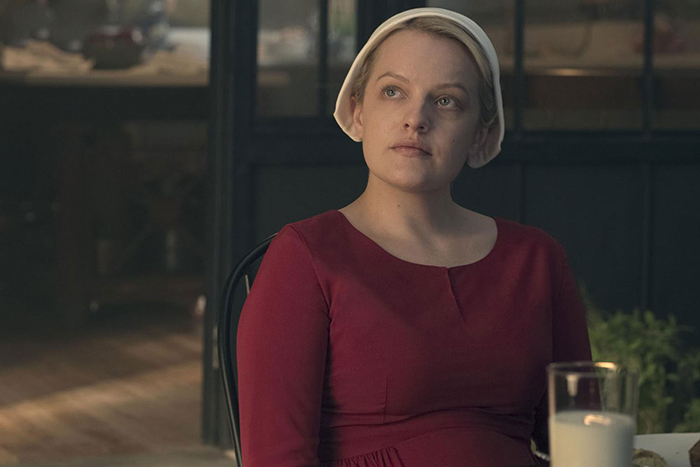
Q: What can you tell us about your collaboration with directors Mike Barker,Kari Skogland on season 2?
Bruce Miller : they are spectacular, they both directed in season one which makes it a lot easier when they came back in season 2. They’re both very strong. Director Mike Barker was our directing producer so he was an executive producer on the show for this season, so he is around for everybody. But you know my interaction with directors is very close. We try to go through, we had a preparation period of about nine days and you try to goes with many meetings that you can and seat go through the excruciating and the new show, of the script over and over again to really make and be very clear because the show does not have a lot of talking, so you have to be very precise about what you want at each moment because you’re not going to get it through the dialog. They are incredible professionals and have so many shows under their belt, and also they were there at the beginning. The better part of this year, the easier part of the season two it is that people have something to watch. When they came at season one, we could not show them anything and because there is nothing to see, I think our collaboration this year has been an attempt to go deeper than just “this is just the show”, but “this is the episode, this is what this world could be"
Q: With social media today, to you feel some pressure to the fans that you need to go further and further or you just go with what it is in your mind ?
Bruce Miller : definitely the later, I mean I listen to what the fans say and I try to be mindful at conversations but you know in some ways, if you let that tell you what stories to tell, you will disappoint them so instead, I mean it isn’t really from my head, is more from Of Fred’s head, June’s head, I try to let her drive the story, what would happen next, what really would happen. I don’t know what you have seen but at the beginning of this season Of Fred gets away and then she gets caught, it is very disappointing but she is in Gilead, she is a pregnant handmaid, she is not Jason Bourne, she will get caught, chances are someone will capture her because that was they’re built to do and although it is terribly disappointing, is a one in a million shot for her to get out and She does not roll the dice one in a million. We try very hard to think in an incredible simplistic way of what would really happen. Sometimes I think that the fans, they have wishes and dreams and there are all their wishes and dreams for her happiness and safety to erase the last few years of June’s life and reunite her with her husband and child but you also have to look at the reality of the world you’re in and the story you’re telling and what you’ve start kind of been not through that any success you have that satisfied the audience.
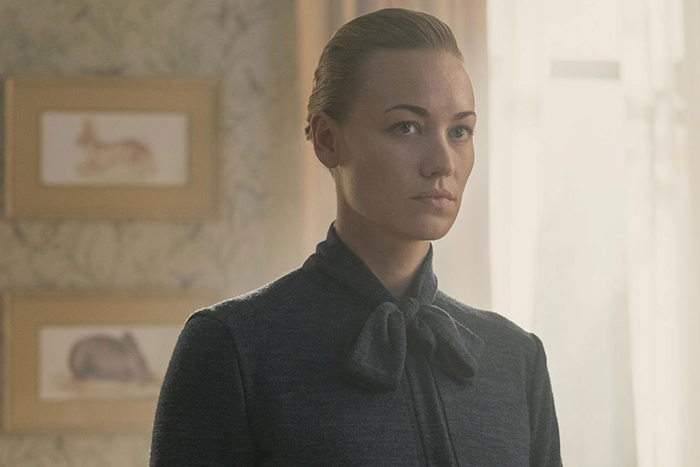
Q: the second season is way more darker than the first one in the settings of photography . It is what you had in mind in the beginning or not?
Bruce Miller : I don’t think we ever aimed been darker, there sometimes when you just naturally follow characters and they broke a lot of rules in season one. If Gilead doesn’t have any repercussions for that, then the show does not make any sense. I have very well tolerance for violence, I don’t like that stuff so we try very hard to show only what we need to show, what naturally comes and also it is imperative to tell the story. At the beginning of this season, there was an execution, a mock execution. We have shown that and afterwards someone said “they were going to hang us but they didn’t” that just don’t have any impact, you have to feel what they’re going through and so it’s horrible but that’s the point, it’s supposed to be horrible. I disagree personally. I don’t think that season 2 is darker. I think anyday, any episode where Of Fred is alive at the end is a huge victory. So I think she is doing great. I think there is a lot of terrible happening around, but she is getting through that ice field.
Q: I have read many good reviews on social media but also people who criticizes the fact that to shame violence against women you show a lot of that.
Bruce Miller : I have the same problem, we’re always struggling with that. I mean, How do you show Gilead, a place where they are very violent, dehumanize women and treat them like sexual slaves, that they are horrible to them, without showing it?. It is like the nature of the beast. Once again, we try to show what is necessary to show to tell the story. You know in season one, we have a female genital mutilation story. We did not show anything, we did not say what happened. She wakes up, she has a bandage, someone talks to her but nobody talks about this mutilation. It is horrifying because of what happened, but we’re not showing anything. We’re just talking about it. It is a balance and it is a difficult balance, it’s something we talk about with every scene , with every pieces of editing that we do and it is one of the thing that made hard it is that our actors, Elisabeth and the rest of our cast, are so strong that you take something and they bring it to life. You are horrified maybe because it feels like is really happening and whether our paper, it might not been as bad once you’ve seen it on screen it’s gut rushing, so you have to be very careful, as I say it’s we’re shooting with live ammo, if you say this is terrible it’ll feel terrible.
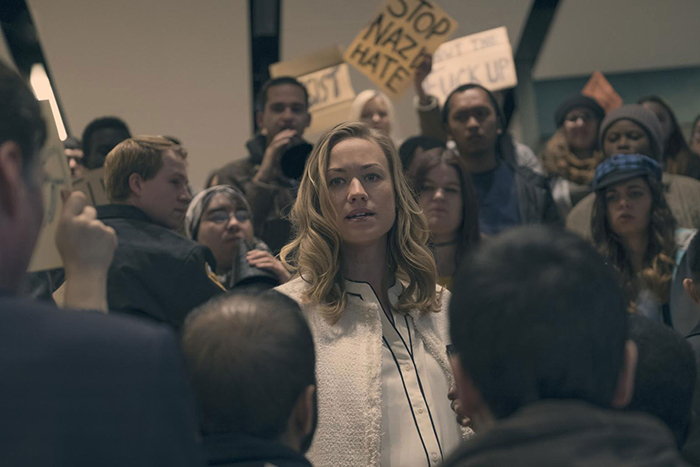
Q: Do You work with the actors to find where you are going to push the characters?
Bruce Miller : of course, we’re lucky to have a very small, very collaborative, incredibly experienced group of actors. They’ve all been in lots of other shows, been in shows that last for a long time. As much as working with them, I do a lot more just watching what they do on the show and deciding where to push them because if I’d asked you what is your best ability as a writer, that might be very different than if I’d read your stuff and decided what’s your best abilities were as writer and then decided how to push you. I tried to get the proof and to put in, look at the work and say “wow that person is funny, funnier than I thought, o is weirder than I thought”, or “there is a strange chemistry between those two” and they may not even noticed. So, you really try to take from what is the final product and to know how can I use that. This is one of the wonderful things about TV is that you have the ability to adjust as you’re going on. It is little like you’re painting a car during a car race, it’s going a thousand miles an hour and you try to change things but it is a great benefit because you get to say “oh that did not work the way that I wanted but I can change it in the next step”
Q: Do you think that you have responsibilities to make this TV show at the time of #MeToo movement ?
Bruce Miller : oh yes, absolutely and especially with the #MeToo movement because so much of that came out from our own industry. This is a very personal experience. I mean, I don’t know if it would be the same if so many of the stories have come up from other industries inicially. These writers, producers, actors are people I know and people I work with through 30(?) years, they are my friends and you feel shitty, awful that they’ve been going, that their careers have been curtailed, that they’ve been going through these experiences. On the one hand you feel like an idiot for not notice it and on the other hand you just feel heartbroken that in some way you were not available to be spoken to. You were not there to help them and they did not tell you what is going on. These people I know since a very long time. You can’t help but have to extrapolate from that to just the under paining of a place like Gilead. And luckily, It started a lot of conversations beyond you telling me what happened to you, but you telling me what happened to your friends, because your friends also are not talking to you, So we’re getting a lot more wide range of stories. Just personally it is heart breaking and hard to get your mind around of certainly something you never feel like you’re going to get over, you feel like a jerk.
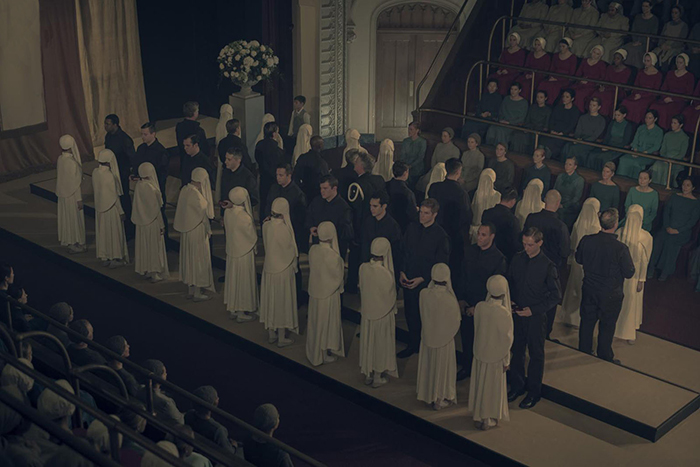
Q: Your show today is kind of evidence with #MeeToo movement and the Trump and so on. We ask to ourselves, why five years ago you said “ok, in five years will be the good step to this old novel from the eighties and will be so relevant”
Bruce Miller : I wish my show was irrelevant that was I am hoping very much, that everybody goes “wow that would never happen”. I think the same. I don’t think it is a crystal ball, is much more that the same forces that came to bear or to create the #MeeToo movement and the election of Trump, unfortunately, were the forces that we were feeling as writers while we were working on the show. But more important is that Margaret Atwood saw those forces rubbing up against each other 35 years ago. It is us updating the things that were pushing those things with the internet, is really taking her foundation and moving it ahead. It is not reinventing it at all.
Q : On this second season we see a little about the “working class” in the society, Will we get to see more?
Bruce Miller : during this season we get see a little bit more about the characters that come from the working class. Nick is in the working class. We get to see pieces. It’s just another thing that I would love to spend time with. All this is fascinating to me, what all of the “cattle” life’s like, the number of conversations about what their apartments buildings look like, all these things are amazing. I think as we move forward on the show, we constantly try to both see and experience the different parts of the society not just to see them and to have a glimpse of them, but actually experience what is like to be a part of it.
Q : of course when we watch a show the obvious ending is the woman taking the lead. Are you kind to go to the obvious way or do you have already a surprise ending in your mind ?
Bruce Miller : I don’t have an ending in my mind as I said before. You guys would have the same ending if I’d had ending in my mind. You know the obvious ending is often the obvious ending in television or in a movie. As I said, when Offred tries to escape in the beginning she gets caught. The only time people get away in movies. In real life people get caught, this is the same thing. The obvious ending often diverges from the real ending, we start with the real ending and in some ways, people say they are so shocked with what happens in the show. Almost always what happens is what would happen and that is what’s surprising, because it never happens on TV. We are very straight forward. We sit-down and say “what would these people do in line. That’s what we do.
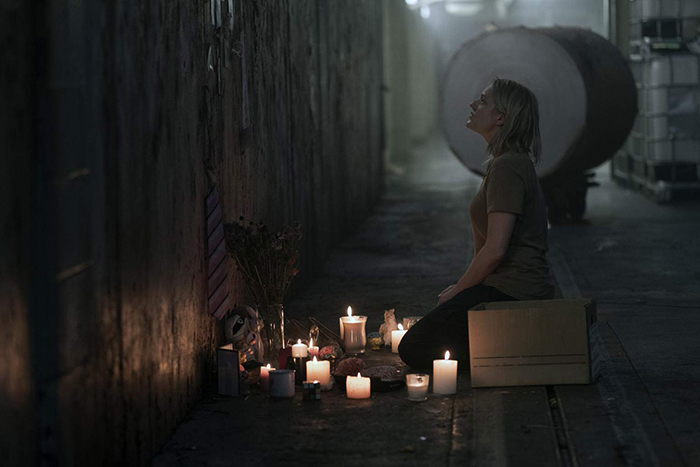
Q: so as in season two, the number of flashbacks is important. You explain much things about how the things come to this. As the flashback with Selena, she had a more important role than now.
Bruce Miller : I know she made her bet and now she still in alive.
Q : I just would like to know how you balance this, because it seems like she had the upper hand before.
Bruce Miller : yes, I think this is one of the things that helps you to understand why you’re maybe not so sympathetic to her, but you understand why she is so furious all the time and also to see that she and Of Fred have something in common. They overlap a lot. They are both very intelligent; one was a writer, one was an editor; Serena was very outspoken and Of Fred was not, but they some kind of were in the political world. I am fascinated by the back stories of the characters but I don’t like to show flashbacks, I like to tell stories in the past, [because a flashback is like] if you just show a little flash or something that happened a while ago, I understand, but I rather to tell full interesting stories. As for Serena the story of what she faced and how certain she was about her solution to the world’s problems. This is for me a really interesting proportion of her strength.
Q : there are feminists that say that the patriarchal oppression came only from men and I have the impression that the show shows that there also women were involved like aunt Lydia, as Serena. They are an strong agent in the patriarchal oppression and sometimes they look stronger than mister Waterford and other men.
Bruce Miller: in the book, Margaret Atwood makes a big point about the oppression of women often takes the form of other women. The way I look that, it was less about the patriarchy and more about the totalitarian state, how the oppressed people in a totalitarian state are often employed to oppress a group, from Jews in world war II to certain minorities all across Europe. The people who know those groups the best and can infiltrate them the best are the people who were members of them. I do think it is one of the most horrifying and hardest swallow parts of the show is the fact that the cruelest of the cruel are the women but it does mean to make sense in terms in the way they are organized in the society. There’s certain venom, frustration that the women are taking out of other women. I think, it’s taking place in a world of patriarchy but is more of totalitarian example than something specifically to do with patriarchy.
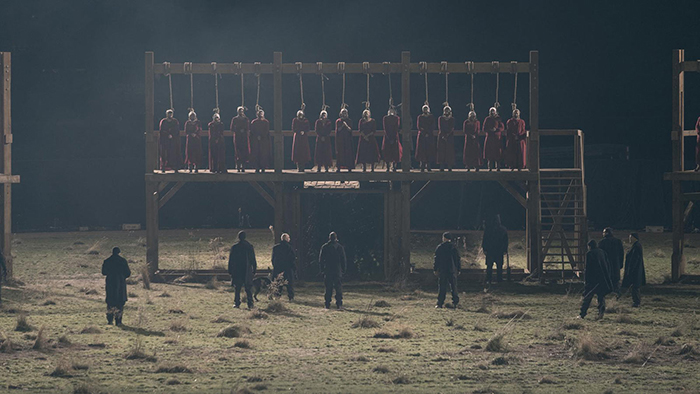
Q: What there for the beginning for the season 2 influences from cinema or series for doing this serie ?
Bruce Miller: for me yes. I sat with Reed Morano who directed the three first episodes season one, you pick up more than cinematographic references, you pick up pieces of films. I am a big fan of Stanley Kubrick visually but acting star wise and story wise, not so much, but visually we talk about in fact the font that we used for the handmaid’s tale is a slight change of the font that Stanley Kubrick used in most of his movies as the title font. But just in terms of the care, of the color and how they bond up against each other, that was taken from there. Reed Morano had been a director of photography and had a encyclopedic knowledge of looks and that kind of things. I am a big movie watcher. Reed and I have a good language of “let steal this scene from this movie, this scene from this movie and glue them all together”.
Q : do you thinking about making a special episode, maybe a very happy episode or a musical ?
Bruce Miller : I don’t know that will fit in this show. I think it will be hilarious and for a Christmas episode. Last year the cast sent some Christmas online cards. Have you seen them online ? Which was just them all dress up like the Waterfords in front of a fire and it was “Merry Christmas from the Waterfords”. They were so unhappy and It was so funny but that was just internal. The other thing you always wonder what the gag reel from the show looks like, with the mistakes on set. Unfortunately Our people are so on the top all the time. There were two gags but nothing that we can show. No, there’s not going to be a musical. Sorry
Q: Are we going to see what is happening with the characters refuge in Canada?
Bruce Miller : oh yes, absolutely, the refugee experience in Canada first of all, It’s reflected so much the news these days. There are refugees all over the world but also a lot of the stories we tell are proxy versions of Of Fred, so this is to say if she escapes things are going all rosy, so still has lot of to deal with. So what you are doing is a kind of be able to tell a story about a possible future for Offred without having to help her escape. If you look at the way Janine is helding the world, she seems to have lost her mind but she seems pretty happy. This is a good option for Offred. The way that Emily deals with the world by biding tooth and nail all the time, she does not seem too happy but it is also another option. So, I think what you want to do is be able to tell a lot of different versions of Offred possible futures at the same time. Also I am fascinated by the idea of what would happens if 25 million Americans move to Canada; What would happen to Canada? You know, the place is very open to refugees. This fascinated me at different levels.
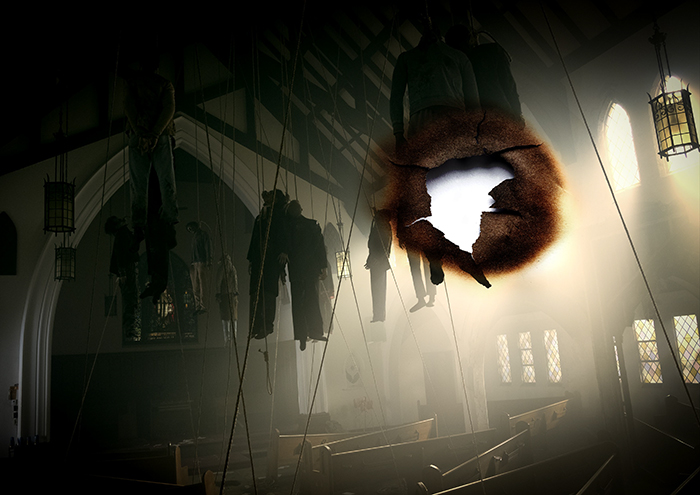
Q : What do you wait as feedback you’ll get on the show by women and men ?
Bruce Miller : One of the stranger things is that I get equal numbers of women saying “Offred is an idiot” and “Offred is a genius” from the same moment or “I will never do that”; we get a lot of “I would never do that”. Sometimes, this happens all the time for every show: The show is criticize for something that happened that a women would never do, it is a women’s idea, that doesn’t mean that it is something that a woman would do, but that’s where it comes from. That is direct at me, as a boy a would never know this. Surely a woman would never write that. The things we wrote together that a woman did. From men, I think men are nastier about Serena that the weirdest thing I think. They want to kill her violently, in ways that surprised me. But the other thing is I think as much as women are really affected by Offred loss of her daughter, the men in the story, feeling Luke’s lost of his wife and daughter that just make them feel impotent and broken in a way that I was surprised that there’s both anger but weird. There’s plenty of weird going on twitter.
Q: before you worked on the serie the 100 and this show, you present women, minorities, people from every origin, I think you really like this and also I like the way you show these people in this serie.
Bruce Miller : I think the key is when you have a thousand channels, you have to start showing. If you show one point of view in these channels is boring. In handmaid’s tale, we tried to just look around our world and to have those people reflected, some people in Boston reflected in this show. We don’t try to reach and to make some sort of social statement, we don’t want to ignore to make social statements. It is very much balancing it.
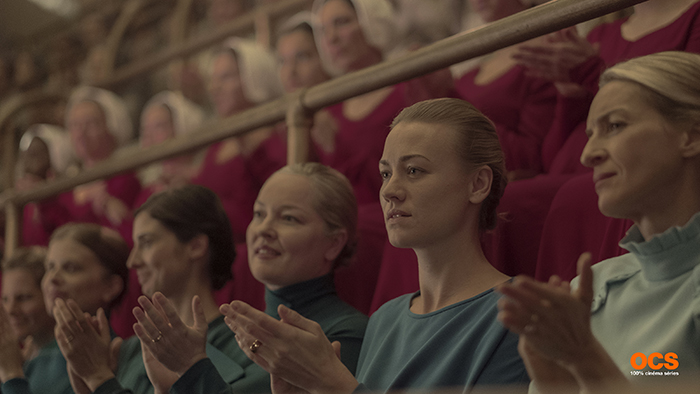
Q: my question that the 100 you used to make a cool mystery show we like and so on, what decided you to make a very controversial show. All people in the world will be against or will like it. It is not very comfortable ?
Bruce Miller : do you really think that I said “this one I’m going to do so everybody around the world will have a different opinion and it will be really controversial ?
Q : I ask for reaction..
Bruce Miller : you really try to do each show to be each show. So on The 100, I did not create it, Jason Rothenberg created the show. But the thing I like in this series and the lesson I took from it is the more realistic you make it, the more you a do about these people in this situation, the more affected it is. It was more of a high concept idea than having more fantastic elements but it was a lesson I took for The Handmaid’s tale. I have an odd career to look at from the outside. The unifying factors are some grounded characters that feel like people in the real world; a career that included “the 100” when I was able to create a show and I was able to create it from the beginning. I wrote the first script. I was able to lay that philosophy and be more cruel at the beginning and my writing staff who was with me on The 100 or Eureka, they knew what the goal was on this show and to keep very grounded, because honestly once it starts feeling not like the real world is not scary anymore, it is very practical. Once you feel like that would never happen, it is a none interesting show. It is only scary because you’re worry that’s going to happen and only you worry if it feels real.
The Handmaid’s Tale season 2 is actually on air on OCS each thursday US +24 since April 26 on OCS Max one episode each week until July 12 (season 1 available in replay)
The Handmaid's Tale
Created by Bruce Miller
Based on The Handmaid's Tale by Margaret Atwood
Starring Elisabeth Moss, Joseph Fiennes, Yvonne Strahovski, Alexis Bledel, Madeline Brewer, Ann Dowd, O. T. Fagbenle, Max Minghella, Samira Wiley, Amanda Brugel
Composer : Adam Taylor
Executive producers : Bruce Miller, Warren Littlefield, Reed Morano, Daniel Wilson, Fran Sears, Ilene Chaiken
Producers : Margaret Atwood, Elisabeth Moss
Running time 47–60 minutes
Production companies : Daniel Wilson Productions, Inc., The Littlefield Company, White Oak Pictures, MGM Television, Hulu Originals
Distributor Hulu
Original network : Hulu (USA), OCS (France)
A big thanks to Dolores Marquez (Lola) for her help on this transcription
Special thanks to Alan Closier (OCS)
Photos Bruce Miller : Boris Colletier (Mulder)


